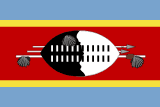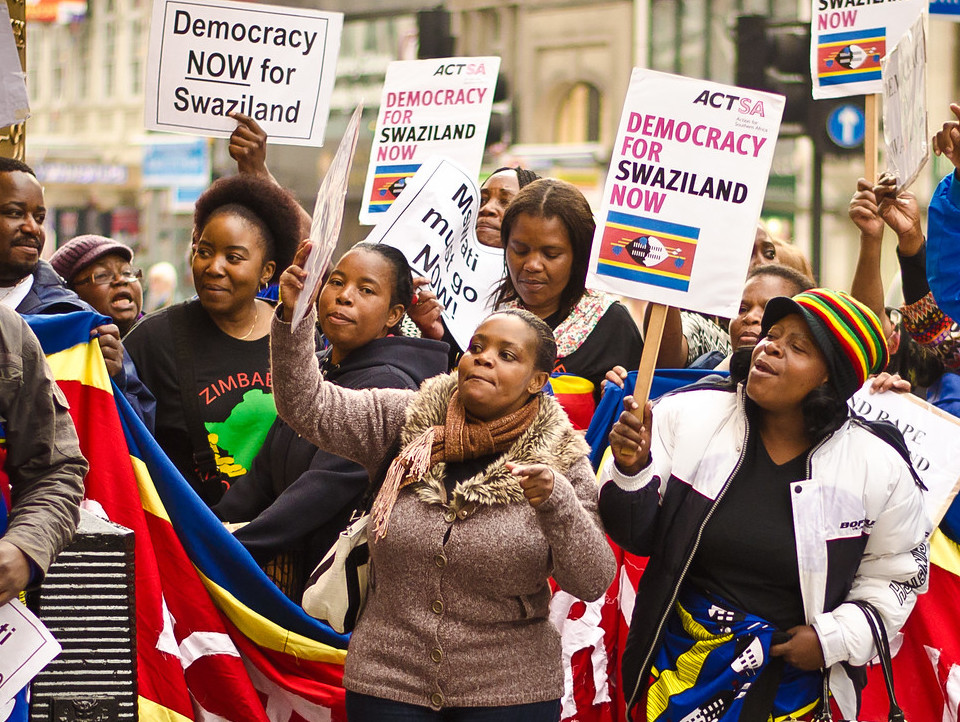
Eswatini
Eswatini performs in the low range in three categories of the Global State of Democracy framework (Representation, Rights and Rule of Law), and performs in the mid-range in Participation. It is among the world’s bottom 25 per cent of countries with regard to the majority of factors. Over the past five years, it has experienced notable declines in Freedom of Expression and Personal Integrity and Security. Eswatini’s primary industries include services and manufacturing; it relies heavily on neighboring South Africa for trade.
The royal line of the Swazi royal family predates British rule and stretches back to 1550. From 1903 until 1968, the country was a protectorate of the British Empire. Political power rests with the royal family, as well as with traditional chiefs, who are themselves under the influence of the monarchy. The parliament does not have political power and political parties are banned. The Tinkhunla system, introduced in 1978, governs elections to the House of Assembly and gives chiefs significant power over who can stand for election; in addition, ten out of a maximum of 76 seats in the House of Assembly are directly appointed by the King. Freedom of expression is repressed by the state, and human rights are regularly violated by security forces and other state actors. These factors led to widespread protests in 2021 and 2022 in support of democratic reform, and attacks carried out by a militant group against the monarch. The government’s repression of the pro-democracy movement has involved extra-judicial killings and torture, the suspected state assassination of a human rights lawyer, the poisoning of an opposition leader, and conviction of two parliamentarians on terrorism and murder charges signal the monarchy’s resistance to reform.
Eswatini also faces myriad other challenges, particularly in the area of development. The incidence of HIV is the highest in the world, and the country has also struggled with tuberculosis. The high poverty rate, severe food insecurity, unemployment (particularly among youth), and vulnerabilities to climate change are of particular concern. Citizens have cited poor government performance in addressing challenges related to the worsening economy and living conditions. Corruption is a rampant issue that has involved high profile government officials, which has in recent years resulted in large-scale losses of government funds.
Despite constitutional protections, women face discrimination and violence, reflecting entrenched patriarchal norms. Almost half of adult women are estimated to have experienced some form of sexual violence in their lifetime and gender-based violence is viewed by citizens as the most pressing women’s rights issue. LGBTQI+ people are also marginalized and suffer stigma, harassment and violence. Sexual activity between men is criminalized under an unenforced colonial-era law but gender-afforming care is legal.
Looking ahead, Freedom of Expression and Personal Integrity and Security are likely to remain areas of change, as the state continues to repress individuals and organizations calling for democratic reforms. The persistence of corruption and impunity, coupled with the worsening public perceptions of these issues, mean it will be important to watch the growing number of investigations being conducted by the country’s anti-corruption commission. It will also be important to monitor the impact of recent international aid cuts on Basic Welfare, particularly on the government’s ability to reduce HIV cases.
Last updated: June 2025
https://www.idea.int/democracytracker/
September 2024
Exiled opposition leader poisoned in alleged assassination attempt

On 24 September, Mlungisi Makhanya, the leader of Eswatini’s main opposition party, the People’s United Democratic Opposition Movement (PODEMO), was found poisoned in his South African home, following what his party and others allege was an attempted assassination by an agent of Eswatini’s government. PODEMO said that Makhanya had been hospitalised after ingesting a ‘pesticide poison’ and described his condition on 25 September as being stable but critical. They noted that the poisoning came shortly after their leader had announced pro-democracy protests planned for October. Makhanya has been living in exile in South Africa after his house in Eswatini was set on fire in September 2022 in an alleged attack by government agents. Eswatini’s government denied any involvement in the poisoning.
Sources: Swaziland News, The Sowetan, British Broadcasting Corporation, International Commission of Jurists, The Guardian
September 2023
Eswatini holds legislative elections
On 29 September, Eswatini held legislative elections to select 59 members of its House of Assembly, the lower chamber of the country’s bicameral parliament (another ten members of the chamber are appointed by the King). Political parties are banned in Eswatini and under its electoral system candidates contest as independents. A major political cleavage in the country is between those who support the country’s absolute monarchy and those opposed to it and, according to media reports, most of the parliamentarians elected are considered to be loyal to the King. Eight women were elected and another five were due to be appointed by the King. This total fell short of the country’s gender quota, which requires at least 30 per cent of members of the House to be female. The elections were observed by missions from the Africa Union and the Southern African Development Community, both of which found them to have been peaceful and orderly but noted the low representation of women in parliament.
Sources: Africa News, Associated Press News, Voice of America, African Union, Southern African Development Community, Daily Maverick
June 2023
Two pro-democracy MPs convicted of terrorism and murder

On 1 June, two MPs at the forefront of Eswatini’s pro-democracy movement, Mduduzi Bacede Mabuza and Mthandeni Dube, were convicted of terrorism and murder in the country’s High Court. The convictions, described by Amnesty International as ‘flawed’, relate to the MP’s participation in pro-democracy protests in 2021. These protests called for reform of Eswatini’s centralised system of government, under which it’s absolute monarch, King Mswati III, enjoys considerable executive powers, including over the judiciary. Anti-terrorism legislation has frequently been used by the state to silence government critics and the charges brought against the MPs were widely perceived to be politically motivated. According to analysts, the convictions signal the king’s strong resistance to democratic reform and, because of his control of the electoral system, this is likely to make it more difficult than ever for pro-democracy candidates to be elected at the forthcoming parliamentary elections, that are scheduled for September 2023.
Sources: Africa News, Voice of America, Southern African Litigation Centre, CIVICUS, Africa Confidential, International IDEA
January 2023
Influential human rights lawyer and democracy activist shot dead

In a development that could further destabilise Eswatini, human rights lawyer and democracy activist Thulani Maseko was shot dead in a suspected state assassination (an allegation the government denies). Since May 2021, the country has been gripped by a violent political crisis, which has pitted the county’s absolute monarch, King Mswati III, against a coalition of political and civil society actors seeking the democratisation of Eswatini. Maseko was a highly influential advocate of a negotiated transition to democracy and commentators fear his death may undermine his cause within the increasingly militant pro-democracy coalition, making the peaceful resolution of the crisis less likely. In recent months, the crisis has descended into violent conflict, with pro-democracy extremists carrying out reprisal killings against the security agencies and Mswati allies in response to the continuing state-repression of protesters (which has included killings, abductions and torture).
Sources: news24, Institute for Security Studies (1), Monthly Review, Institute for Security Studies (2)
See all event reports for this country
Global ranking per category of democratic performance in 2024
Basic Information
Human Rights Treaties
Performance by category over the last 6 months
Blogs
Global State of Democracy Indices
Hover over the trend lines to see the exact data points across the years
Factors of Democratic Performance Over Time
Use the slider below to see how democratic performance has changed over time
